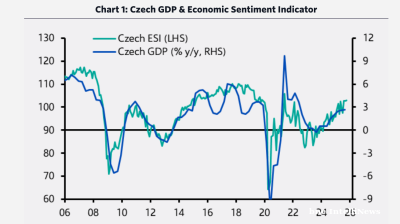The takeover of British postal service Royal Mail by Czech energy and media oligarch Daniel Kretinsky will be probed under the UK's National Security and Investment Act, including looking into potential Russian links.
Kretinsky’s 2022 share increase was reviewed under the previous Conservative government, but UK broadcaster the BBC wrote that “this probe will be more thorough than last time because Mr Kretinsky is trying to buy the whole parent company in a £5bn (€5.9bn) deal, including assumed debts, as opposed to a stake”. The probe could potentially stop the deal.
The BBC referred to sources familiar with the Royal Mail deal as writing that Kretinsky’s team is in talks with Business Secretary Jonathan Reynolds and government advisers and these are “ongoing and have been constructive”.
In an earlier development, Kretinsky's EP Group struck a deal to buy International Distribution Services (IDS), owner of Royal Mail, after its improved offer was recommended by the company's board in May. IDS turned down an indicative £4.5bn takeover bid in April.
Kretinsky and his business partner Patrik Tkac of Slovak J&T Finance Group also triggered a security review in August 2022 after they increased their shareholding in Royal Mail above 25%.
The BBC highlighted that Kretinsky’s companies control a gas transmission business Eustream which brings Russian gas into Europe “with the knowledge and permission of the European Union”, noting “it is a transmission business only and none of Mr Kretinsky’s companies buy or trade in Russian gas”.
Kretinsky’s EPH is a 49% shareholder in Slovakia’s gas transmission utility Eustream and EPH also exercises managerial control over Eustream. The remaining 51% share is held by the Slovak state.
“As well as links to Russia, officials will look at whether the UK could be hurt by the private purchase of a postal service that has been delivering mail since it was founded by Henry VIII,” the BBC wrote.
Concerns are raised over Royal Mail’s future and the BBC pointed out that the trade union of postal workers, the Communication Workers Union, stated that “the contractual obligations negotiated between the failed current Royal Mail board and Mr Kretinsky are not strong enough to protect workers, customers and the crucial infrastructure that Royal Mail provides for our communities and the economy”.
Kretinsky has faced negative coverage in the British and English-speaking press, which frequently refers to him as the “Czech sphinx” for his “reputation for mystery [which] suggests he is difficult to understand”, as the FT’s famous Lex column put it. In June the Guardian ran an investigation into Kretinsky’s ties to J&T, a Slovak privatisation-era financial group through which he rose to run Central Europe’s largest energy empire EPH, highlighting controversial property deals stretching from the Czech Republic to the Turks and Caicos Islands.
Boosted by the energy crisis, Kretinsky and Tkac have been on a seemingly endless shopping spree, although in June Kretinsky lost what appeared like a sealed deal to get hold of an embattled French technology and IT company Atos, following a change in Atos’ management and criticism of the Atos takeover from some French lawmakers.
Kretinsky also faces criticism from the Czech branch of the International Press Institute for the reporting in his media house Czech News Centre (CNC) outlets not observing journalist standards when criticising the Czech government’s acquisition of Net4Gas, which EPH was also interested in, and which the Czech government bought in a push to increase security on the country’s energy market.
Kretinsky’s spokesperson and CNC board member Daniel Castvaj described the Royal Mail probe as an “expected step in the whole process”, adding that “we have gone through it successfully already when increasing our share at IDS” in a comment for the Czech Press Agency (CTK).
This spring Castvaj told Czech liberal outlet Denik Referendum, which reported on Kretinsky's 2016 Moscow meeting with Gazprom boss Alexei Miller, that Gazprom “has for many decades been the largest transporter of gas using Eustream”.
“It is fully logical that there needs to be communication with Gazprom. This has always been taking place strictly in line with all the applicable legal provisions,” Castvaj was quoted as saying by DR then.
“In Russia, business ties between an entrepreneur and government structures are important. It is nothing that should raise unusual questions; these are normal economic contacts, which at the time looked differently than from today’s perspective,” Czech businessman Peter Fellegi, who facilitated a 2016 meeting between Miller and Kretinsky, told DR in an interview published as part of the reporting which DR carried out in collaboration with the Slovak Jan Kuciak Investigative Centre (ICJK).
Czechia, like other Central European countries, was nearly fully dependent on Russian gas imports and took major measures to reduce the dependency below 5% only after the Russian full-scale invasion of Ukraine in February 2022.
News

Northern Afghanistan hit by M6.3 tremor
A powerful earthquake has struck northern Afghanistan, leaving at least four people dead and scores injured, according to local officials. The numbers are expected to rise significantly.

Kerala becomes India’s first state to declare freedom from extreme poverty
The state's Chief Minister described the moment as the dawn of a new era for Kerala, attributing the achievement to a sustained four-year effort under the Extreme Poverty Alleviation Project.

Tensions rise in Serbia as protesters clash outside parliament
The confrontation followed a massive anti-government demonstration in Novi Sad on November 1.

Russia launches Khabarovsk nuclear submarine designed to deploy nuclear-capable Poseidon drones
Russia has launched a new strategic nuclear submarine, the Khabarovsk, which is capable of carrying a dozen of the Kremlin’s recently unveiled nuclear-powered Poseidon torpedo—a next-generation weapons system that Putin called "unstoppable."




